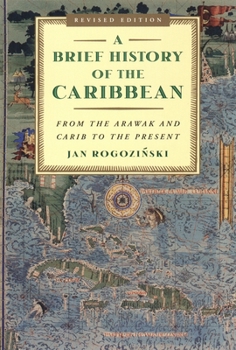A Brief History of the Caribbean: From the Arawak and Carib to the Present
Select Format
Select Condition 
Book Overview
This comprehensive volume takes the reader and student through more than five hundred years of Caribbean history, beginning with Columbus's arrival in the Bahamas in 1492. A Brief History of the Caribbean traces the people and events that have marked this constantly shifting region, encompassing everything from economic booms and busts to epidemics, wars, and revolutions, and bringing to life such important figures as Sir Francis...
Format:Paperback
Language:English
ISBN:0452281938
ISBN13:9780452281936
Release Date:September 2000
Publisher:Plume Books
Length:432 Pages
Weight:1.08 lbs.
Dimensions:1.0" x 6.1" x 9.0"
Age Range:18 years and up
Grade Range:Postsecondary and higher
Customer Reviews
4 ratings
Excellent, but Rogonzinki's conservatism is obvious
Published by Thriftbooks.com User , 17 years ago
This is an excellent book for the lay student of the Caribbean. The author provides a wonderful array and facts and stories giving the book just the right feel between textbook and a readable work. All of the necessary details pour out to give the reader an amazing look into the heritage of the Caribbean. A special admiration goes to the author for his work in explaining the role of pirates (or privateers, depending on the day) in the power politics of the imperial rivalries in the Caribbean. A slight criticism comes in Rogonzinki's descriptions of the Native Americans, which seems to agree with the paternalistic descriptions of them put forth by the colonizers. But aside from that and similar conservative slants, this is an excellent book.
Scholarly and Accessible
Published by Thriftbooks.com User , 21 years ago
This is a densely documented chronicle that will be of interest to the general reader for its explanation of how the distinct Caribbean island cultures developed from their popular discovery in 1492 to the present. More serious students of the subject will find a veritable library of reference material in the appendix of suggested readings. Visitors to the region will have a better understanding of the similarities and differences of these island communities based on the historical specifics of their political and social history. Today the importance of tourism, offshore banking, "assembly" factories, and indeed the drug trade are evident. But in the beginning it was a lust for gold that mesmerized Spanish explorers. The "Black Legend" that was Spanish settlement brought inhumanity and disease and wiped-out the idigenous peoples. The envy of the English, French, and Dutch helped launch the age of buccaneers who acted more and sometimes less on their behalf to steal Spanish plunder. With a greater European commitment sugar plantations took hold requiring the cheapest form of labor - slavery. Dutch business acumen in international trade, specifically in the crucial areas of lending, insurance, and marketing, enabled them to establish the infrastructure of an industry. The gradual abolition of slavery began in Great Britain, and here organized religion gets credit for bringing credible pressure on the government. Rogozinski's commentary on current issues in the Caribbean basin is just as helpful, as say, in the matter of Cuba. There is little to explain Fidel Castro's early, consistent, deep-rooted enmity towards the United States in these pages. What does seem clear is that U.S. foreign policy towards Cuba was inconsistent and stumbled dreadfully from the Bay of Pigs fiasco to total disorientation during the Jimmy Carter administration:"The Carter administration approved of some marxist [sic] regimes in the 'Third World' countries and supported some groups claiming to be revolutionary. Andrew Young, U.S. ambassador to the U.N., praised Cuban intervention in Angola. George McGovern and Frank Church, influential Democrat senators, traveled to Cuba and extolled Castro's regime"Rogozinski's history of the region suggests that Cuba's totalitarian regime is an aberration destined to change with Castro's eventual passing. Forceful, charistmatic leaders are common in Caribbean politics. But ideology, atheism, political repression, and a centrally controlled economy are not.
Well Organized, History Lesson of the Region
Published by Thriftbooks.com User , 23 years ago
I bought the first edition of this book over 8 years ago, and couldn't let it down. "A Brief History of the Caribbean," by Jan Rogozinski simply is one of the most well researched and organized books on Caribbean history ever published. As a Latin American Studies major in college, this book was very reliable and informative in many of studies, and it allowed me, by utilizing the many maps and charts found in the book, to understand the very nature of Caribbean politics, culture, and most importantly, history. Everything from Pre-Colombian civilization to Post-Independence woes are covered here, and the author has released an updated edition with information as recent as of January 1999. I strongly recommend that readers of this book also read "A Continent of Islands," by Mark Kurlansky to gain more knowledge of this beautiful but troubled region.
An excellent history of the Caribbean.
Published by Thriftbooks.com User , 25 years ago
This is an objective and well-written book. Dr. Rogozinski has focused on the important events and forces which has shaped the Caribbean countries. The book has given me a greater understanding and appreciation of the region and has made my travels there more enjoyable.




